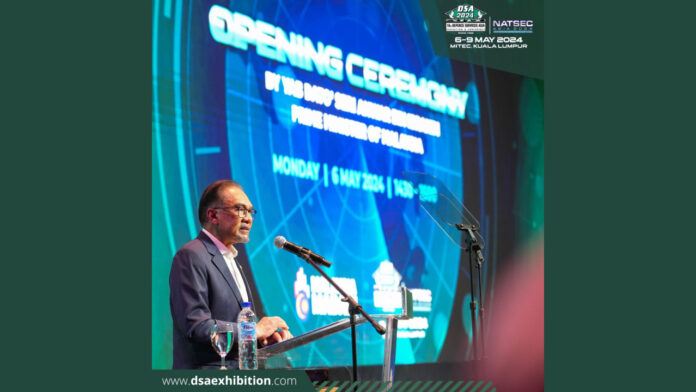The 2024 DSA and NATSEC show was opened by Dato Seri Anwar Ibrahim – the first time that a Malaysian Prime Minister has done so. The organisers claim that the event is bigger than ever this year, with 1,320 companies from 60 countries represented.
Anwar described an increasingly fragmented global security landscape, with multiple challenges ranging from climate change to cyber attacks. The stakes have never been higher, he added, but Malaysia could play an important role in shaping a safer, more stable world. The country was well placed to facilitate dialogue, because it was “one of the few that affirms its neutrality.” The PM also urged the Malaysian defence industry to seize the opportunity to showcase its expertise at the event.
At the 2024 Putrajaya Forum earlier the same day, Malaysian Chief of Defence Staff General Mohammad Ab Rahman said the country sought to leverage new technology, but was mindful of the ethical challenges posed by – for instance – autonomous weapons systems. The application of artificial intelligence and military robotics raised accountability and proliferation concerns. Malaysia utilises uncrewed aerial systems for border surveillance, disaster response and counter-terrorism, but is mindful of regulatory challenges and privacy concerns.
US General Daniel Hokanson was another key speaker at the Forum. He is the Chief of the National Guard Bureau, which runs a State Partnership Program (SPP) that pairs the national guards of American states with the security forces of over 100 foreign nations. The programme started in 1993 with the three Baltic nations emerging from the Soviet bloc, and has become a key tool of US security co-operation overseas.
Hokanson said that the partnerships involve the transfer of US expertise in areas such as search and rescue, disaster response, and cyber security. But these are mutually beneficial relationships, he added, with the US learning from the experience of the partner countries. For instance, he noted that the one between the Alaskan National Guard and Mongolia brings together two regions that both have remote geography and extreme climates.
The SPP has been extended to other military activity, such as one between the Washington National Guard and the Royal Malaysian Air Force for air defence and air domain awareness.
by Chris Pocock













